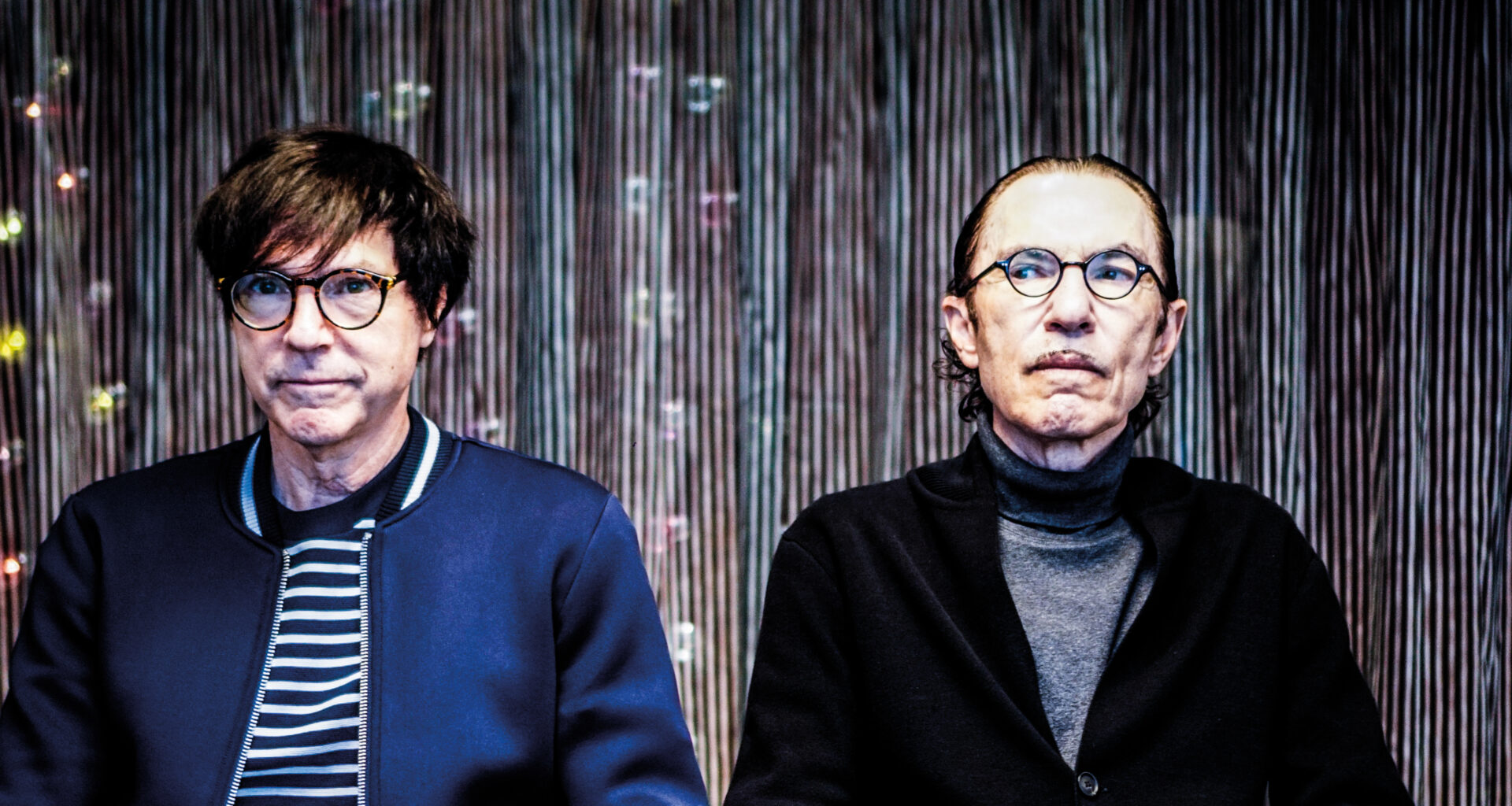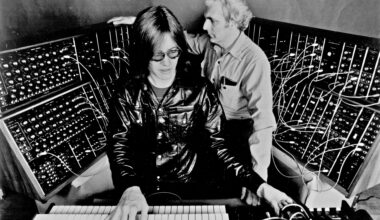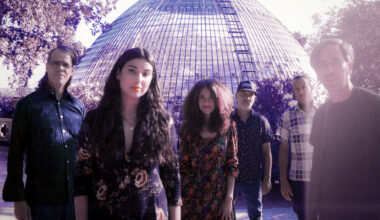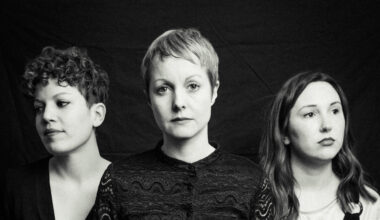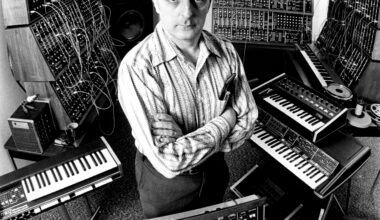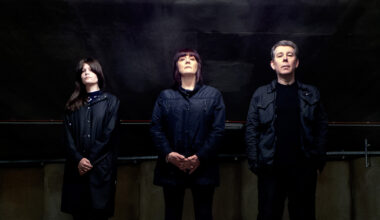Ever since their extraordinary debut on UK TV in 1974, Sparks have pushed the boundaries of pop and electronic music. Their latest album suggests that the future still belongs to them
I am talking to Ron and Russell Mael in what is described as the “library” of a hotel in Shepherd’s Bush, London. It is a very strange room indeed – like a soft play area in decor, with mock Chinese lanterns, large, coloured light bulbs and a Union Jack beanbag nestling in the corner. With a handful of music biographies on the less-than-groaning shelves and a Warhol-style portrait of Amy Winehouse hanging on the wall, it feels like it was put together by some young interior designer who sees rock and pop being very much in the past tense.
Sparks sit oddly in this room and uniquely in the timeline of popular music. They have been doing something very modern for a very long time. They made their name on ‘Top Of The Pops’ in 1974 with their performance of ‘This Town Ain’t Big Enough For Both Of Us’ and have, by some distance, outlived the programme, perhaps they’ve even outlived pop music itself as many of us understood it in its heyday.
“We have actually lived through all of pop music’s history,” says Russell. “Not that many people have. As such, we know the value of certain eras. Maybe we are in a unique situation, we’ve had a really long career, something in the area of 23 albums. Because we value what pop music represents, we feel an obligation to uphold the standard: the sense of adventurousness, vitality, of us against them. Those things have been devalued, but if nobody else wants to uphold value, we will.”
“Not that we’re engaged in a grand salvation plan for pop, but we do feel an obligation,” adds Ron. “We don’t feel that pop is a lesser genre, it’s just different. We’re interested in seeing just how far you can push it. We’re also lucky in that the core Sparks fans are accepting of us; if what we do sounds a little alien at first, for them, that’s good.”
Which brings us to their latest record ‘Hippopotamus’. Russell describes it as an album of “discrete” pop songs, a break from the grand narrative of 2009’s radio musical, ‘The Seduction Of Ingmar Bergman’, on which Ron made his first-ever vocal contribution. ‘Hippopotamus’ is full of trademark humorous touches, and yet is boldly assertive of pop’s breadth in its chandelier elegance. It suggests Yello, the genre-hopping 60s pop of Van Dyke Parks’ ‘Song Cycle’ album and Sondheim musicals, but most of all of it reminds you of Sparks. Despite the individuality of the tracks, from the poignant grandeur of opener ‘Probably Nothing’ to the string-soaked wit of ‘Edith Piaf (Said It Better Than Me)’, it is a cohesive album, an experience best taken in full, from start to finish.
“That’s a nice comment because we feel that as well,” says Russell. “We did consider letting go of certain songs, but decided that if we did, something would be lost from the whole. These days, the idea of the album has been devalued. People can cherry-pick what they want, but we’re old school in the way that we believe in the validity of the album as a whole.”
When Sparks made that first ‘TOTP’ appearance, glam was still just about holding its own as a pop force. Like Jimi Hendrix a few years earlier, Sparks’ record company decided that these disaffected Anglophiles from the West Coast of the USA would have a much better chance of pop success if they used the UK as a launch base. They advertised for a “beard-free” bass player, and before long they were away. As US ex-pats relocated to Britain, they understood all too well the appeal of 1970s glam, a sliver of colour and spangle in a country otherwise mired in the 1950s.
“Oh yes!” recalls Russell. “We know about the dismal grey and we know about the two or three TV channels that were on until midnight if you were lucky, before ‘God Save The Queen’ and the test card. And where do you find a cappuccino in this country?”
“The positive of that lack of variety was that everything was so concentrated into ‘Top Of The Pops’,” says Ron. “It was huge exposure for us, people had no choice but to watch that show.”
Hilarious to me as a 10-year-old was the short hair and Hitler moustache of Ron as he played, as if in mute disgust at the effeminate falsetto antics of his brother Russell on vocals. That he played on anyway under weird sufferance, as if any minute he would hit a key that would set off a pile of dynamite, was slightly disconcerting. I ask the Maels if they were aware of contemporary comic characters like Blakey and Basil Fawlty. They were not.
“In Los Angeles, you formed your view of England from reading Sherlock Holmes,” says Ron.
It’s maybe no coincidence that another figure who fascinated me amid all the longhairs and flares of 70s pop was the similarly punctilious civil servant-resembling Florian Schneider of Kraftwerk, who reared up on ‘TOTP’ with ‘Autobahn’ just months later in 1975. Maybe there were connections, one of which was that Mael’s mid-70s keyboard playing had a mechanical, dehumanised aspect that anticipated synthpop.
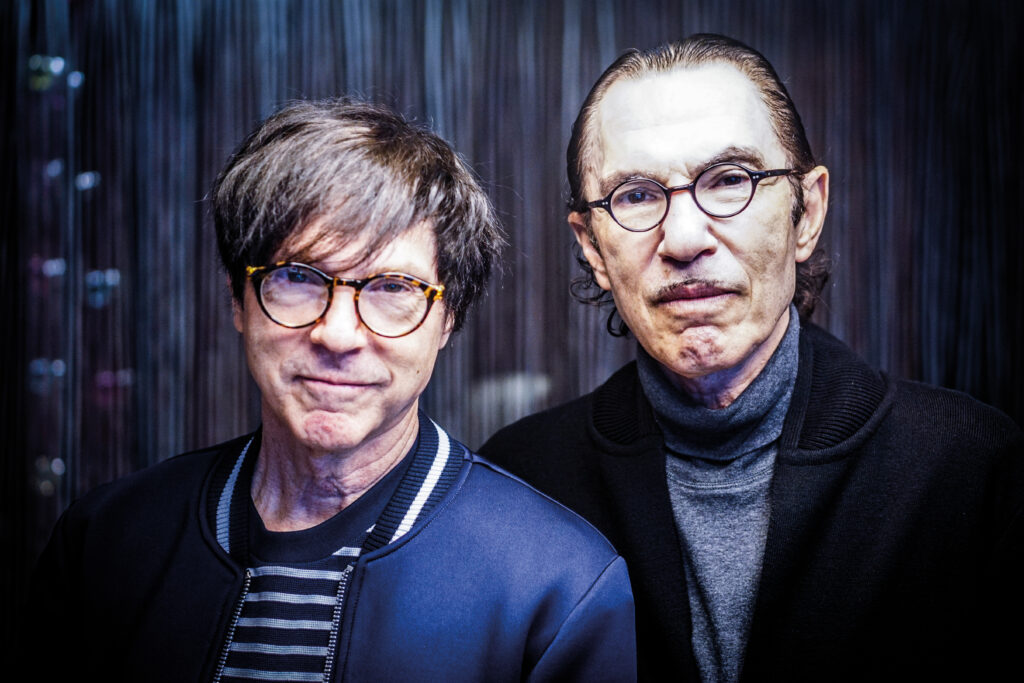
“Looking back, the way I played was definitely very sequenced,” agrees Ron. “When we did the ‘Two Hands, One Mouth’ tour in 2012, in which we played just as a duo, I couldn’t play the way I did with a band. I had to play around the beat and fill in rhythmic gaps. So that made me more aware of that. It did sound like electronic music.
“The first keyboard I used was an RMI electric piano. When we first moved here, I thought it sounded terrible, so I bought an Echoplex [delay unit] to spice up the sound. And that sound was a big part of the ‘Kimono My House’ and ‘Propaganda’ albums. So what was an attempt to salvage a bad keyboard took on a quality of its own. That tape delay has a quality that’s very important to those albums.”
Similarly, Ron wrote songs for Russell in keys unsuitable for a male voice, which exacerbated the sense of contrast that would be a trademark of future synth duos from Yazoo to Soft Cell to Erasure.
“‘This Town…’ was all over the map melodically,” says Russell. “There was also the fact that we didn’t care about transposing things into other keys that were more suitable to the male voice, so some of the notes are incredibly high, way out in the stratosphere.”
Although it was a shock to the system for the synth-phobic rock establishment in 1979, it’s retrospectively quite logical that the brothers took the decision to pare down to a duo, working in the new medium of electronic pop and taking on Giorgio Moroder as their producer.
“At that time we thought we’d gone as far as we could with a band,” says Ron. “We heard Donna Summer’s ‘I Feel Love’ on the radio, with that icy, dynamic, driving electronic sound, but with a vocal. We loved Kraftwerk, ‘Autobahn’ was somehow a hit in America, but that wasn’t what we were after. Giorgio was aware of Kraftwerk, but he had a different sensibility regarding the use of electronics in a song.”
The result of the partnership was their 1979 smash hit ‘No. 1 In Heaven’ album, which featured two huge hits in the shape of ‘The Number One Song in Heaven’ and ‘Beat The Clock’.
“Moroder liked using semi-traditional vocals with electronics, which we thought was a great contrast,” says Ron. “It was a risk, because the singers he was used to working with like Donna Summer were polished in a certain sense. Also, we had never worked with electronics.
He wasn’t using drum machines. He’d have Keith Forsey come in for 15 minutes and play a kick drum. Later, we were up at his house and he brought in an early version of the LinnDrum. We thought, ‘Hmm, we don’t wanna use that’, because we still had the mindset of a band. So rhythm-wise, it was all done by real people.”
Despite their strong musical personalities, there was never a clash between Giorgio and Sparks.
“It was a leap into the unknown,” says Russell. “The three of us approached the project with no expectations as to what it was going to be. The specificity of our lyrics, songs like ‘Tryouts For The Human Race’ was something Giorgio was unused to. For him, lyrics had been a minimal thing. I wondered if he’d be intimidated by our lyrics, but he embraced them.”
The result was an album of frantic sequencer music, with the electronics on tracks like ‘The Number One Song In Heaven’ bubbling wildly, as if from coloured tubes in a sound laboratory.
“It kind of looked that way, too,” says Ron. “Those machines had so many lights. When you work with a producer you have to relinquish some of your control. We fought for the songs, but as far as the general direction went we kind of sat back. We could never play that album live at the time because it was achieved on a roomful of synthesisers. We weren’t able to play any of those songs until 1994.”
During the 1980s, Sparks surfed the synthwave, taking on board the prevailing styles as economics began to dominate the national pop grid. These included the hi-NRG elements of 1986’s ‘Music That You Can Dance To’, a perfectly titled Sparks album: doubly clever, ironic but not ironic.
“We never went to clubs,” says Russell. “It was an idea of what might sound cool in clubs. We only learned from other people that it had gone down really well.”
Gradually, however, they realised that both creatively and commercially, synthpop was delivering diminishing returns, and they appeared to distance themselves from the genre with the electropop-dissing ‘The Rhythm Thief’, the opening track from 2002’s classically-inspired ‘Lil’ Beethoven’ album.
“We were kind of restless,” says Russell. “It’s tempting to capitalise on something that works, but it’ll never be as good if you do it again. We’ve been asked about the ‘FFS’ album we did with Franz Ferdinand and if there’ll be a second one. Well, it was a good album, we loved touring it, but it’s not going to have the same impact if you repeat the whole thing.”
But surely Sparks must find themselves under pressure from today’s desperately conservative, retro-maniacal industry to revisit their past glories?
“Yeah, and so when we have revisited our past, we have tried to do it in a surprising way,” says Ron. “We did a plagiarism album – reworking a lot of our old songs. We were really rebuilding these songs from scratch. We do feel uncomfortable about revisiting the past; that said, we did those 21 nights playing 21 albums in their entirety. In a way, that was trying to put it to rest.”
Casting back to 1974, it’s strange to think of their contemporaries now as either dead, fallen by the wayside, or their relevance long deteriorated. Only Sparks have maintained their course.
“Maybe the benefit was that, being just two people, we could slip into certain situations,” says Ron. “If you’re part of a five-piece band, you’re working in that framework, sound-wise, the whole time. Whereas us, there’s singing and there’s the songs, that’s pretty fixed, but we’re free to go off in other directions. It’s allowed us to feel renewed and work with different sounds and different apparatus.”
It’s fun to think that, on his first ‘TOTP’ appearance, Ron was representing the future. Midge Ure’s little moustache was just the tip of it. The squares eventually took over.
“It’s a little strange,” laughs Ron. “Some of the irony of looking like an old man got lost through the years!”
‘Hippopotamus’ is out on BMG
